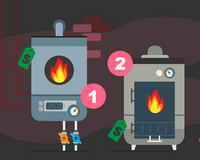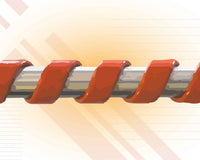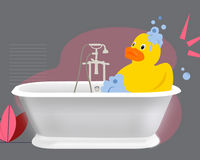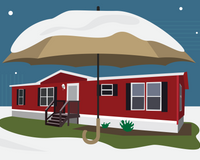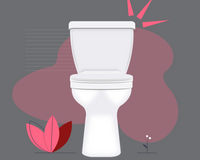Originally published on ThePennyHoarder by Steve Gillman.
When I was young, I bought an older mobile home on a small lot for $19,500. In the years I lived there I collected at least $50,000 in income by renting out rooms. Then I sold the place for $45,000.
As you might guess, I don’t have the common bias against mobile homes.
Once more, I have to disagree with financial guru Dave Ramsey. Just like his advice about the use of credit cards (he says don’t use them, but I’ll get $2,000 in sign-up bonuses and cash back this year), he oversimplifies when advising readers not to buy mobile homes.
He says they go down in value, and adds “when you buy a mobile home, you’re buying a very large car in which to live.”
Yes, mobile homes go down in value; at least, if you buy them new and put them on a rented lot.
But there are at least two situations where mobile homes make sense — and can help you save big money.
Buy an Older Mobile Home on Land
My old mobile home was very comfortable, but let’s humor Dave and call it a big car. So what happens in a growing community when you park an old car on a piece of land you own?
Over the years, it loses a little more of what value it has left, but the land goes up in value. The net effect? You can sell the land with the “car” for much more than you paid.
When you buy a nice older mobile home, you’re mostly buying land value. But unlike a car, people can very comfortably live in a mobile home, which helps explain why, by my calculations, the value of my mobile home went up more quickly than site-built homes in the area.
What About Equity Gain?
Some would argue that — even if the mobile home appreciates at the same rate — you’ll gain more equity with a more expensive “regular” house.
For example, if a $100,000 house and a $40,000 mobile home each rise 50% in value over the years, you’ll gain $50,000 in equity with the house versus $20,000 with the mobile. But that scenario ignores a few important points.
First, there is the ongoing cost. For example, my mortgage payment was $257. Had I bought a site-built house of similar size, I would have paid at least $80,000 instead of $19,500.
I had, at most, a 10% down payment (I put $5,000 down on the mobile home), so I would have had a mortgage loan for $72,000 that cost about $605 per month (interest rates were much higher then).
Of course, the property taxes, which are based on value, would have been four times as high with the house. Insurance would have cost more too.
And I can tell you from experience (three mobiles, five houses and counting) that a regular house costs more to maintain and repair. I estimate it would have cost me $500 more per month to buy a house.
That’s $6,000 per year saved by buying a mobile home, and yes, I did save it. In fact, I paid off the mortgage in a few years, and then my monthly savings went to about $700 per month versus that regular house.
This brings up another little secret about buying a mobile on land: You can pay down your loan faster, and therefore build equity faster.
Think of it this way: If I could afford the $605 payment for a house, I could pay that much every month toward my $15,000 mobile home mortgage loan. More, in fact, since my other costs were lower.
That’s why I was able to quickly eliminate my mortgage (that, and the room rentals). The high interest rate (12%) was not very significant because I paid it for such a short time.
Had I bought an $80,000 house and held it for the same 14 years, it would have been worth about $130,000 in that area. But I would have spent an average of $600 more per month over those years (versus my low-cost mobile), which adds up to over $100,000 extra going out.
The truth is, I couldn’t afford the house anyhow at that time, so a mobile home was my only realistic option. With that in mind, along with the $45,000 sales price and $50,000 or more from room renters, I think buying a mobile home on property made a lot more sense than renting.
A Mobile Is a Great First Home
Yes, you may want a more traditional house someday. But this is great way to buy your first place for several reasons, including:
- Lower monthly costs
- Easier introduction to homeownership
- Faster equity gain
- It can be a profitable rental when you buy a regular house
When you buy with land, you can sometimes get a mortgage loan from a local bank, as I did — for mobile homes in parks, you have to get a pricier personal property loan).
Some bigger lenders, like 21st Mortgage Corporation, will also loan on mobiles. The Consumer Financial Protection Bureau states “More than 2,000 institutions reported originating one or more manufactured housing purchase loans in 2012″ (the most recent statistics).
If you can’t find a regular lender, don’t give up. Many sellers offer financing to make it easier for buyers. I sold two of my mobile homes that way, one with a $1,000 down payment and the other with a $5,000 down payment.
What to Look For When You Buy a Mobile Home
The numbers may be different, depending on your area. In some towns, you can get a house for $80,000 and a mobile on land will still cost $60,000. In that case, you might want the house.
In other places, the cheapest decent site-built house might cost $100,000 more than a comfortable mobile home on land. That’s where you might want the mobile.
To get the best value, you should probably buy an older mobile home. That way, it has already lost most of its “pull away value,” so the remaining value is primarily land with a livable home.
Look for neighborhoods where people take care of their mobiles. Yes, there are a lot of stereotypes, but there are many nice mobile communities.
When it’s time to buy, look for mobile homes built after 1976. That’s whenHUD standards went into effect.
Your Housing Crash Safety Net
Here’s something people don’t consider about cheaper mobile homes: If the housing market crashes, you lose less on a mobile home.
After I sold my mobile home in Michigan in 2005, the market tanked. Houses in the area went down in value by about 30%. Mobiles on land fell less in value (investors hold up prices at the low end because of the rental income value).
Even if it was the same loss rate, my buyer lost about $13,000 in equity, versus the $39,000 he would have lost if he had bought a house with similar square-footage for $130,000.
What About Buying in a Park?
Even here, Dave Ramsey is wrong. Yes, if you buy a new mobile home and put it in a park it will plummet in value.
But if you buy an old enough mobile home, it has already lost most of its value, so you have less to risk. Then it becomes a matter of crunching the numbers.
In 2005, my wife and I bought a mobile home in a park in Tucson, Arizona, for $9,000. We wanted a house, but I felt uneasy about buying anything at that time. Even the smallest livable homes were going for $150,000 or more.
The lot rent was $300 per month, so we saved about $200 per month versus the $500 apartment we came from.
A year later we moved to Colorado to buy a house, and sold the mobile home for exactly what we paid. In other words, we saved about $2,000 on rent for that year.
Oh, and the market crashed. We would have lost at least $40,000 on a $150,000 house.
Buying a mobile home in a park will often make sense if…
- Your alternative is to rent
- You buy a cheap (usually older) mobile home
- Lot rent is reasonable
- You pay cash
Even if you have to borrow, it can make sense. Let’s look at an example, assuming you currently rent an apartment for $750 per month, have $2,000 saved for a down payment and you buy an older mobile home in a nice park:
- Mobile home price: $12,000
- Loan amount: $10,000
- Closing and moving costs: $1,000
- Loan term: 3 years
- Interest rate: 15 percent
- Monthly payment: $347
- Monthly lot rent: $375
- Monthly maintenance: $75
You’ll notice your monthly cost is $797, versus $750, for rent. It’s still the better deal. If you stay in the apartment:
- You get nothing for your rent
- Your rental costs will stay the same or rise
If you buy the mobile home, after three years you will:
- Spend an extra $1,792 (closing costs and higher monthly costs)
- Pay off the loan, so your monthly cost will drop to $425
- Be able to sell the mobile for something
What if you sold the mobile for only $9,000 because you trashed it? Deduct your $2,000 down payment and the $1,792 in additional costs, and you walk away with over $5,000, versus the nothing you would have from renting the apartment.
You can save money by buying a mobile home, but it’s all about the numbers. So get ready to do some calculating.


